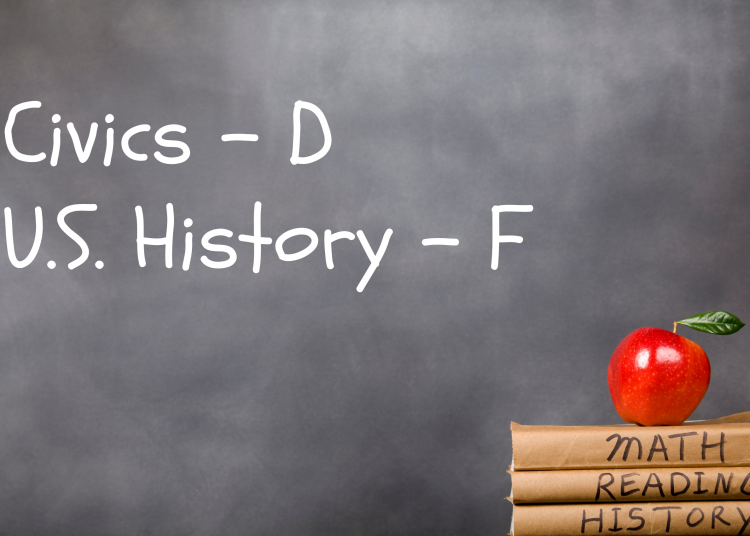DES MOINES, Iowa – The Fordham Institute released their grades of every state’s U.S. History and Civics academic standards. Iowa’s standards were found wanting.
According to their website, the Thomas B. Fordham Institute is a non-profit organization located in Washington, D.C. and Ohio that, according to their website, promotes “educational excellence for every child in America via quality research, analysis, and commentary.”
Five jurisdictions were considered exemplary in both U.S. History and Civics: Alabama, California, Massachusetts, Tennessee, and the District of Columbia. Iowa joined 19 other states with standards deemed inadequate.
“The State of State Standards for Civics and U.S. History in 2021 evaluates the K–12 civics and U.S. History standards adopted by the fifty states and the District of Columbia based on the quality, completeness, and rigor of their content and the clarity of its presentation. Reviews were conducted by a bipartisan team of veteran educators and subject-matter experts with deep knowledge of civics and U.S. History,” the Fordham Institute explained in their announcement of the report.
Iowa received a ‘D’ for its Civics standards and an ‘F’ for its U.S. History standards. The report overview stated, “Iowa’s current civics and U.S. History standards are inadequate. Vagueness and overbreadth lead to a dearth of specific content in both disciplines, and there is no discernible coverage of U.S. History at the K–8 level. A complete revision of the standards is recommended.”
The Iowa State Board of Education adopted Iowa’s social studies standards in 2017, aligning them to the C3 Framework for Social Studies Standards.
“Iowa’s Academic Standards provide a set of common expectations for school districts across the state while allowing for decisions regarding curriculum and how it is delivered to be made locally. Local districts make decisions about which specific, historical content best meets the needs of the communities they serve, while using the approach of teaching critical thinking skills that are reflected in Iowa’s Social Studies standards,” Heather Doe, spokesperson for the Iowa Department of Education, told The Iowa Torch in an email.
“Iowa uses a collaborative process with stakeholders for establishing and updating Iowa’s Academic Standards, including for social studies, which underwent an extensive standards review, development, and adoption process starting in 2015. This work culminated in the Iowa Board of Education’s approval of revision of Iowa’s Academic Standards for Social Studies, which was done by Iowa educators and social studies professionals. As a result, we have social studies standards that reflect Iowa’s values and needs, which prioritizes teaching our students how to be critical thinkers about the information they encounter, as opposed to memorization of a list of facts,” she added.
The Fordham Institute found Iowa’s civics standards too vague.
“Iowa’s civic standards are written so broadly that it’s often impossible to say what students are meant to learn, and what elementary civics content does exist is unambitious,” they wrote.
“Education standards should educate. Yet Iowa’s civics standards seem only to point mutely in the direction of content, hoping that districts and teachers will pick up their drift,” the report authors complained.
They provided examples of the high school standards being too broad:
“(T)he first standard calls for students to ‘evaluate the powers and responsibilities of local, state, tribal, national, and international civic and political institutions, how they interact, and the role of government in maintaining order’ (SS.Gov.9-12.12.13). This wording alerts no one to the fact that federal government powers are limited, state powers are general, local powers are delegated, tribal powers are permitted, and the powers of international political bodies are rarely backed by force. Some government’ responsibilities’ are Constitutional duties, while others are the result of exercising discretionary ‘powers.’ How governments ‘interact’ depends on a web of regulatory, spending, legal, and political relationships that could be a course by itself. Yet the existing standard gives no guidance on how to navigate or prioritize these issues. Indeed, a teacher who is teaching anything about government could claim to be satisfying it.”
And then:
“(T)he third standard asks students to ‘analyze the origins of government with attention to the purposes of government’ (SS.Gov.9-12.15). The wording doesn’t make clear whether the class should study the political theory of Thomas Hobbes and John Locke, the origin of the cities of Mesopotamia and Greek city states, or the founding debates and documents of the United States.”
The report authors credited Iowa for “paying attention to citizenship skills and dispositions from Kindergarten through fifth grade” and intentionally developing critical thinking skills from sixth grade through twelfth grade.
They also noted that while state law requires high school students to learn about the Bill of Rights and receive voter education, neither topic is included in the standards.
Fordham Institute’s harshest criticism is directed at Iowa’s U.S. History standards.
“Iowa’s social studies standards essentially ignore U.S. History before grade 8, and the middle/high school outline is almost without substance. There is little effort to promote shared exposure to essential historical content across the state,” the report authors write.
“There is no discernible U.S. History content in grades K–5,” Fordham notes, and it doesn’t get better in sixth and seventh grades. However, upon reaching eighth grade, Fordham says the standards finally include some U.S. History content:
“Of the five content standards in the history strand, four are general, asking students to study ‘connections among early American historical events and developments in broader historical contexts’ (SS.8.21), changes in ‘prevailing social, cultural, and political perspectives’ in early American history (SS.8.22), ’causes and effects of events and developments in early American history’ (SS.8.23), and the structure of Iowa government. Only one item, under the ‘historical sources and evidence’ anchor standard, actually mentions any historical specifics—a bare and scattered list of documents that students might study, ‘such as the Declaration of Independence, the Bill of Rights, the Constitution, Washington’s Farewell address, the Louisiana Purchase treaty, Monroe Doctrine, Indian Removal Act, Missouri Compromise, Dred Scott v. Sanford, and the Treaty of Guadalupe-Hidalgo'” (SS.8.24).
“That is the entirety of U.S. History substance through grade 8.”
It doesn’t get better in high school.
Fordham describes the High School U.S. History standards as “scattered thematic points and a handful of decontextualized specifics offered as seemingly random examples with no meaningful outlining or even a clearly defined course scope.”
Fordham provided five recommendations for Iowa:
- Provide a rigorous introduction to civics in elementary and middle school
- Provide more specific and detailed guidance in high school, particularly in the standards that relate to civic and political institutions.
- Provide substantive U.S. History outlining to encourage shared exposure to essential content.
- Organize content as the content itself dictates, not by fixed thematic categories.
- Provide an introductory survey of U.S. History prior to eighth grade.
The Iowa Legislature’s education committee chairs had different opinions about the report.
State Rep. Dustin Hite, R-New Sharon, the Iowa House Education Committee chair, defended Iowa’s standards but expressed willingness to study the critique further.
“I believe the state of Iowa’s standards are intentionally vague to allow flexibility for the teachers and school districts to provide the best education for their students. We trust our teachers to do a great job,” he told The Iowa Torch. “To solve any issues that may arise, we have focused on ensuring parents have a voice in their child’s education rather than dictating a strict checklist to teachers from the state. This is something we can take a look at to determine if any changes are necessary.”
State Senator Amy Sinclair, R-Allerton, the Iowa Senate Education Committee chair, said this report sounds an alarm.
“While I greatly appreciate the effort many Iowa social studies educators put into crafting the state standards, this ‘F’ grade brings to light our need to focus on the essential principles of our nation’s founding and the fundamental civics knowledge necessary for every citizen. Reading, math, and science are certainly priorities, but to ignore the basic understanding of our nation’s history is a grave mistake for the education of the next generation,” she told The Iowa Torch.















